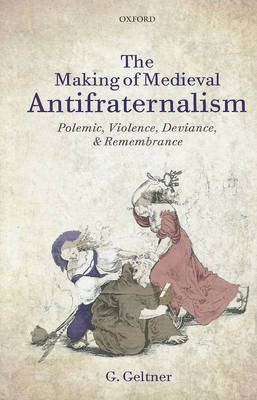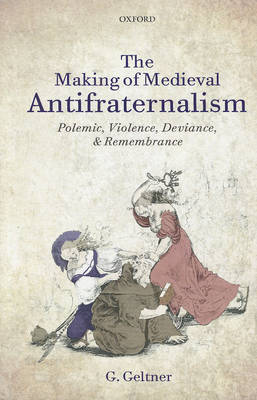
- Retrait gratuit dans votre magasin Club
- 7.000.000 titres dans notre catalogue
- Payer en toute sécurité
- Toujours un magasin près de chez vous
- Retrait gratuit dans votre magasin Club
- 7.000.0000 titres dans notre catalogue
- Payer en toute sécurité
- Toujours un magasin près de chez vous
The Making of Medieval Antifraternalism
Polemic, Violence, Deviance, and Remembrance
G Geltner
Livre relié | Anglais
206,45 €
+ 412 points
Description
The mendicant orders-Augustinians, Carmelites, Dominicans, Franciscans, and several other groups-spread across Europe apace from the early thirteenth century, profoundly influencing numerous aspect of medieval life. But alongside their tremendous success, their members (friars) also encountered derision, scorn, and even violence. Such opposition, generally known as antifraternalism, is often seen as an ecclesiastical in-house affair or an ideological response to the brethren's laxity: both cases registering a moral decline symptomatic of a decadent church. Challenging the accuracy of these views, Geltner contends that the phenomenon exhibits a breadth of scope that on the one hand pushes it far beyond its accustomed boundaries, and on the other supports only tenuous links with Reformation or modern forms of anticlericalism. Drawing from numerous sources, from theological treatises to poetry and criminal court records, Guy Geltner shows that people from all walks of life lambasted and occasionally assaulted the brethren, orchestrating detailed scenes of urban violence in the process. Their myriad motivations and diverse goals preclude us from associating antifraternalism with any one ideology or agenda, let alone allow us to brand many of its proponents as religious reformers. At the same time, he demonstrates the friars' active role in forging a medieval antifraternal tradition, not only by deviating from their founders' paths to varying degrees, but also by chronicling their suffering inter fideles and thus incorporating it into the orders' identity as the vanguard of Christianity. In doing so, Geltner illuminates a major chapter in Europe's social, urban, and religious history.
Spécifications
Parties prenantes
- Auteur(s) :
- Editeur:
Contenu
- Nombre de pages :
- 208
- Langue:
- Anglais
Caractéristiques
- EAN:
- 9780199639458
- Date de parution :
- 18-05-12
- Format:
- Livre relié
- Format numérique:
- Genaaid
- Dimensions :
- 236 mm x 157 mm
- Poids :
- 467 g

Les avis
Nous publions uniquement les avis qui respectent les conditions requises. Consultez nos conditions pour les avis.






